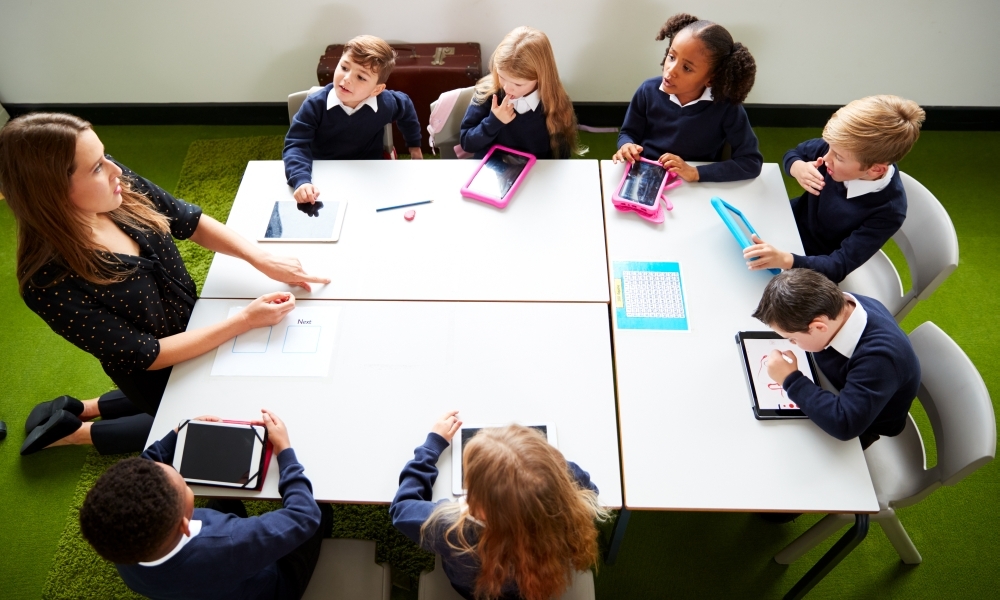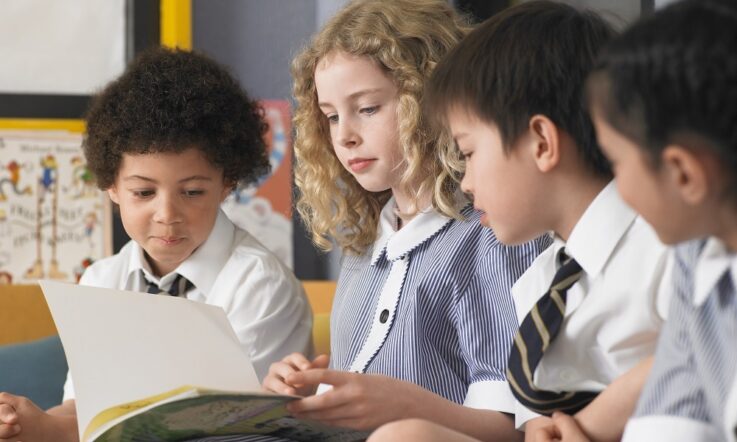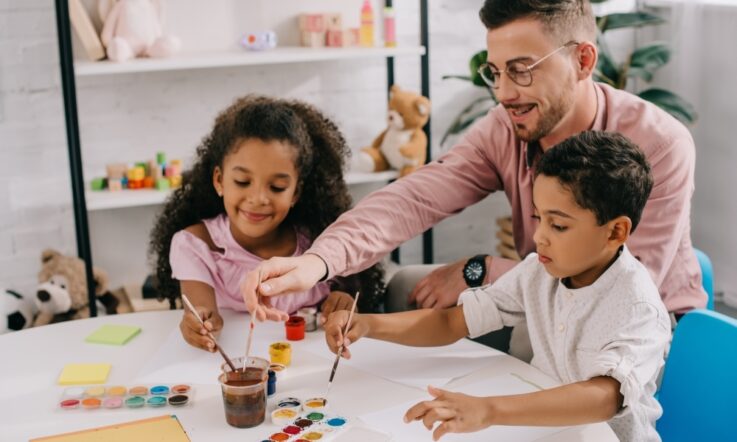This podcast from Teacher is supported by the Victorian Government. Generous financial incentives are available for qualified early childhood teachers and educators to take up positions across Victoria. Relocation support is also available. Learn more about opportunities at vic.gov.au/kinder.
Thanks for listening to this episode of Teacher Staffroom, where we catch you up on the latest evidence, insight, and action. I'm Rebecca Vukovic.
What does it mean to be a Totally Inclusive School? The latest instalment of Teacher’s Bookshelf includes an extract from the book Becoming a Totally Inclusive School: A Guide for Teachers and School Leaders, written by Angeline Aow, Sadie Hollins and Stephen Whitehead. According to the authors, ‘a Totally Inclusive, equitable and just institution is where all learners have access to the curriculum in learning spaces that continually strive to eliminate oppression’. In today’s episode, I’m going to be talking a bit more about this Teacher’s Bookshelf article, as well as a School Improvement podcast episode featuring Angeline and Sadie, which explores this topic of diversity, equity and inclusion in greater detail. Later on in the episode, I’ll also be sharing some of the outstanding contributions we’ve published this month, from both Teacher readers and academics working in education. Let’s jump straight in.
Okay, so first up I want to talk a little more about the extract we published from Becoming a Totally Inclusive School: A Guide for Teachers and School Leaders. The extract was taken from Chapter 9, where the authors introduce the Continuum on Becoming a Totally Inclusive School – aimed at helping individuals and institutions identify where they are according to 6 stages of development.
Here's a quote from the piece that I’d like to share with you – it’s the authors discussing the importance of measuring growth.
A Totally Inclusive School continually collects and analyses data and revisits this continuum to ensure that the learning community understands what different stages look like to prevent regression. In short, the institution values monitoring for growth, and documenting and evidencing inclusive practices to help communicate milestones in transparent ways. The school also balances using internal methods to measure growth, with external methods to ensure that assessments are objective. Regular reporting to the school community identifies progress and strengths and celebrates the dynamic learning community in which evolving identities can thrive.
We also published a School Improvement podcast episode with 2 of the authors of the book, Angeline Aow and Sadie Hollins. Teacher Editor Jo Earp interviewed them about what they mean by Total Inclusivity, and they took a closer look at the Continuum on Becoming a Totally Inclusive School. There are 6 stages of the continuum and they chat about each of them, thinking about what that stage might look like in a school and what next steps could be to move to the next stage.
I’d like to share a short clip from the episode, it’s Sadie discussing why it’s important for schools to look beyond one-off or tokenistic efforts, to really start making sustainable change.
In terms of some next steps – maybe for schools to prioritise funding around Diversity, Equity, Inclusion so it's not one-off workshops or it's not a consultant that just comes in on a one-off basis, that you're really working over that long-term. You see this as well in international schools there's a high turnover of headteachers and you think to really make a change…I mean this, you know, discriminatory practice has been happening since we've known schools, right? You can't change that in a year. So, you need to be planning, you know, 3-5 years in advance, and what that change will look like when those teachers, when those leaders, move on…that has to be sustained. At this Stage, engaging board members – it goes beyond the school, it's everyone in that community and especially those that have quite a lot of influence within the school. And I think it's to increase accountability measures and to measure what you're doing in the school. Like I’ve said, if there's no follow-up from some of the work being done, how do you know it's making a difference and how do you know where you need to go?
Here’s something to think about:
In this podcast, Angeline Aow says it’s helpful for teachers and leaders to go back to basics and ask: What does our school stand for? And what do we actually mean by this? What would the answer to those questions be for your own school?
It’s been an exciting month here at Teacher, as we launched our new initiative Teacher Awards. The Teacher Awards are aimed at recognising outstanding approaches to teaching and school leadership across the K-12 sector in Australia. There are 8 Award Categories and you can nominate yourself, a colleague or a team of staff. Our Awards recognise a range of achievements like fostering strong school-community partnerships, excellence in staff collaboration, and cultivating an inclusive and positive school culture. You can find out more by visiting the Teacher Awards website where you can get to know our outstanding Judging Panel, as well as read the FAQ which answers all your questions about how to get started with a nomination. There are just over 2 weeks left before nominations close, so get your entry in today!
As I’m sure you’re aware, it's tax time here in Australia and that means you’ll be thinking about what to include in your return. So, what are the common expenses incurred by teachers and education professionals that you can claim for, and what are some of the things that aren’t tax deductible? Lucky for you, we have you sorted! This month we published our annual tax tips for teachers article, which is packed full of advice for educators. There’s information on travel expenses, purchases for work in the classroom, professional learning, working from home, private expenses and more! Make sure you take a look and perhaps share it with your colleagues who may find it useful.
Coming up, we’ll take a closer look at some of the contributions we’ve published on Teacher this month. But first, here’s a quick message from today’s sponsor.
Victoria needs more Kinder teachers and educators. Make the move and you’ll be rewarded with $9000 plus relocation support. So now you can turn a rewarding career into a great adventure. Learn more at vic.gov.au/kinder. Best start, best life. Authorised by the Victorian Government, Melbourne.
Moving on now, we have published some outstanding contributions this month, from both readers and experts in education. I’d love to whip through some of the highlights but remember, if you’re keen to read the full article or find anything I’ve spoken about in today’s episode, there are links in the transcript of this podcast at teachermagazine.com
Okay so the first contribution I want to chat about is a 2-part series on Professional Learning Communities, written by Dr Lars Andersson, Principal of Richmond High School in Victoria. In the first piece, he shares details of the planning and preparation phase at Richmond High School. In the follow-up piece he discusses the implementation experience, and the impact on practice and student outcomes.
Here's a quote from the second article where Lars is talking about how teachers continually refine their practice.
Over time, teachers continue to refine their teaching practice through this ongoing cycle of inquiry, learning and growth. This is an alternative to traditional forms of professional learning for teachers, which have often relied on presenters advising teachers to adopt a new practice that is not necessarily anchored in the teacher’s real context. By comparison, the professional learning that happens in our PLC meetings (and between meetings) emerges directly out of the lived reality of students and teachers, as PLC members review evidence of learning and strategise about how to make improvements for a particular band of learners.
Here is something to think about: As a school leader, are you regularly seeking feedback from staff about their experience with new initiatives or programs? How does this inform your future decisions?
We also published a piece on helping teachers to design a rubric by Jodi Wilson, Reporting and Assessment Coordinator at Dromana Secondary College in Victoria. In her article, Jodi shares her school’s story on how they developed their own guidelines on how to construct rubrics for years 7-10. After reading the full article on Teacher, consider this:
How are you and colleagues using assessment rubrics in your own school? Are there any areas for improvement in either the design or the use of the rubric, to better support both teachers and students?
And finally, we also published a really informative piece on how teachers can support students impacted by trauma, written by Dr Lorna Hepburn. She writes:
[Do] teachers need to be trained therapists? A resounding no. Teachers can provide the best support to students impacted by trauma by developing positive relationships, implementing evidence-informed classroom practices, providing effective instruction and managing the classroom environment so that all students, including those affected by trauma, can thrive.
Here are some final questions I’ll leave you with. What systems do you have in place to identify and refer students who need therapeutic support? Are all staff aware of these identification pathways, and the referral criteria?
That's all for this episode, and you’re now all caught up on the latest evidence, insight and action. Links to all the content and the resources I’ve mentioned will be in the transcript of this podcast available over at our website, teachermagazine.com.
Subscribe to our podcast channel wherever you get your podcasts from, so you can be notified of any new episodes as soon as they land. If you want to keep listening now though, you can access the 200+ episodes already in our archive. And, while you’re there, we’d love if you could rate and review us.
This podcast from Teacher is supported by the Victorian Government. Generous financial incentives are available for qualified early childhood teachers and educators to take up positions across Victoria. Relocation support is also available. Learn more about opportunities at vic.gov.au/kinder.



